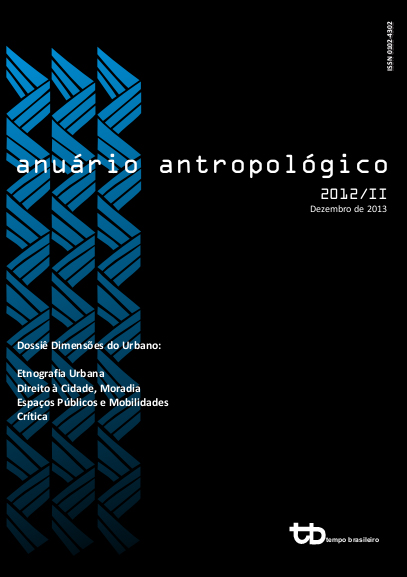O “velho” hukou na “nova” China urbana
reflexões sobre uma dualidade contemporânea
Palavras-chave:
hukou, registro domiciliar, China urbanaResumo
O artigo trata do sistema de registro domiciliar vigente na China desde o governo de Mao Tse Tung. Tal registro obrigatório, denominado hukou, acarreta um rígido sistema classificatório dual que diferencia os cidadãos chineses de acordo com o pertencimento territorial atribuído e com a destinação a atividades agrícolas ou não-agrícolas. Apesar de haver crescente flexibilização do sistema nas últimas décadas, argumenta-se que a manutenção do mesmo tem como consequência uma série de desigualdades e estigmatizações, principalmente em relação à queles que vivem nas cidades sem a devida classificação urbana. Tais diferenciações perfazem uma dimensão imprescindível para compreender as transformações na China contemporânea.
Downloads
Referências
CASTELLS, Manuel. 2000. “Espaços de Fluxos e Espaços de Lugar”. In: ___. A Sociedade em Rede. São Paulo: Paz e Terra.
CHAN, Kam Wing. 2010. “The Household Registration System and Migrant Labor: Notes on a Debate”. Population and Development Review, 36(2):357-364.
CHAN, Kam Wing & BUCKINGHAM, Will. 2008. “Is China Abolishing the Hukou System?”. The China Quarterly, 195:582-606.
CHEN, Nancy et alli (orgs.). 2006 [2001]. China Urban. Ethnographies of contemporary culture. Durham, NC: Duke University Press.
CHO, Mun Young. 2012. “Dividing the poor: State governance and differential impoverishment in northeast China”. American Ethnologist, 39(1):187-200.
DOCUMENTS. 2010. “A Call for Reform of China’s Household Registration System”. Population and Development Review, 36(2):405-407.
FAQUHAR, Judith & ZHANG, Qicheng. 2005. “Biopolitical Beijing: Pleasure, Sovereignty, and Self-Cultivation in China’s Capital”. Cultural Anthropology, 20(3):303-327.
FAN, C. Cindy. 2008. “Migration, Hukou and the City”. In: Shahid Yussuf & Anthony Salch (orgs.). China Urbanizes: Consequences, Strategies and Policies. Washington D.C.: The World Bank. pp. 65-89.
HARVEY, David. 2010. The Enigma of Capital and the Crises of Capitalism. Oxford: Oxford University Press.
HSING, You-Tien. 2010. The great Urban Transformation. Politics of Land and Property in China. Oxford: Oxford University Press.
JIANG, Shiqing; LU, Ming & SATO, Hiroshi. 2012. “Identity, Inequality and Happiness: Evidence from Urban China”. World Development, 40(6):1190-1200.
JOHNSON, Ian. 2013. “China Embarking on Vast Program of Urbanization”. New York Times, 16 June: A1L. Academic OneFile, Web, 8 July.
KEQIANG, Li. 2013. “China will stay the course on sustainable growth”. Financial Times, Sept. 8. Disponível em: http://www.ft.com/cms/s/0/03377ccc-16e0-11e3-9ec2-00144 feabdc0.html#ixzz2gVfCTOgQ. Acesso em: 01/10/2013.
KUANG, Lei & LIU, Li. 2012. “Discrimination against Rural-to-Urban Migrants: The Role of the Hukou System in China”. PLoS ONNE 711: e46932. doi:10.1371/ journal. pone.0046932.
McGee, T.G. et alli. 2007. China’s Urban Space. Development under market socialism. London and New York: Routledge.
NABUCO, Paula. 2012. “Hukou e migração na China: alguns apontamentos sobre divisão do trabalho”. Revista de Economia Contemporânea, 16(2). Disponível em: http://dx.doi. org/10.1590/S1415-8482012000200004. Acesso em: 13/09/2013.
ONG, Aihwa. 2006. “Reingeneering the ‘Chinese soul’in Shanghai?”. In: ___. Flexible Citizenship. Asian Experiments at the Art of being Global. Durham, NC: Duke University Press.
PATRIOTA DE MOURA, Cristina. 2012. Condomínios no Brasil Central. Expansão Urbana e Antropologia. Brasília: Letras Livres/ Editora UnB.
PINHEIRO-MACHADO, Rosana. 2011a. Made in China. Informalidade, pirataria e redes sociais na rota China-Paraguai-Brasil. São Paulo: Anpocs/Hucitec.
_____. 2011b. “Fazendo Guanxi: dádivas, etiquetas e emoções na economia da China pós-Mao”. Mana, 171:99-130.
ROY, Ananya & ONG, Aihwa. 2011. Worlding Cities. Asian Experiments at the Art of Being Global. Oxford: Blackwell Publishing Limited.
SIBERT, Andreas. 2008. From Somewhere to Nowhere. China’s internal Migrants. Baden: Lars Muller Publishers.
STOUT, Kristie Lu. 2013a. “Is Xi Jinping’s ‘Chinese Dream’ a fantasy?”. Disponível em: http://edition.cnn.com/2013/05/26/world/asia/chinese-dream-xi-jinping/index. html. Acesso em: 04/10/2013.
_____. 2013b. “China’s great migration from Hukou Hell”. CNN Wire, 8 Feb. Academic OneFIle, Web, 8 July.
WORONOV, T.E. 2004. “In the eye of the chicken. Hierarchy and marginality among Beijing’s migrant schoolchildren”. Ethnography, 53:289-313.
TANG, W. & YANG, Q. 2008. “The Chinese Caste Urban System in Transition”. The Chinese Quarterly, 196:759-779.
YANG, Jie. 2011. “The Politics of the Dang’an: Spectralization, Spatialization, and the Neoliberal Governmentality in China”. Anthropological Quarterly, 84(2):507-533, Spring.
YUNONG, Huang. 2012. “Family relations and life satisfaction of older people: a comparative study between two different hukous in China”. Ageing and Society, 32(1):19-40.
Zhang, Li. 2001. Strangers in the City: Reconfigurations of Space, Power, and Social Networks Within China’s Floating Population. Stanford: Stanford University Press.
_____. 2010. In Search of Paradise. Middle-class living in a Chinese Metropolis. Ithaca: Cornell University Press.
ZHANG, Li & ONG, Aihwa (orgs.). 2008. Privatizing China. Socialism from Afar. Ithaca and London: Cornell University Press.
ZHANG, Zhuoni & TREIMAN, Donald J. 2013. “Social origins, hukou conversion, and the wellbeing of residents in contemporary China”. Social Science Research, 42:71-89.
Downloads
Publicado
Como Citar
Edição
Seção
Licença
Copyright (c) 2013 Anuário Antropológico

Este trabalho está licenciado sob uma licença Creative Commons Attribution-NonCommercial-NoDerivatives 4.0 International License.
https://creativecommons.org/licenses/by/4.0/legalcode.en
Creative Commons - Atribución- 4.0 Internacional - CC BY 4.0
https://creativecommons.org/licenses/by/4.0/legalcode.en



